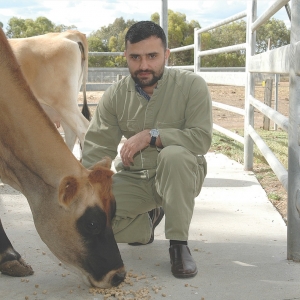To date no treatments or vaccines have been available in Australia for BT and no accurate diagnostic tests for livestock producers. However Jabbar’s project has improved the understanding of the disease, prevalent in Australian cattle.
Jabbar, a senior lecturer in veterinary parasitology at the University of Melbourne, has created a rapid, low-cost diagnostic tool for regular monitoring of BT.
“In 2011 we were approached by a senior veterinarian to investigate an outbreak of haemolytic anemia in beef cattle near Seymour, Victoria. In this study, we found the outbreak was associated with pathogenic strains of Theileria orientalis – the causative agent of BT in Australia and first time reported theileriosis in Victoria,” Jabbar says.
“Little was known about the epidemiology, diagnosis and economic impact of theileriosis, so we decided to investigate.”
For 12 months Jabbar and five other researchers have used his 2013 Dairy Australia award to research diagnosing herds. The research will also further regular monitoring of BT in Australia.
“We have developed a high-throughput assay (diagnostic tool) for the rapid diagnosis of BT. Using this, we can detect two virulent and two avirulent strains of Theileria orientalis. This diagnostic tool will be available to cattle farmers nationally through diagnostic laboratories.”
During the course of the project Jabbar also assessed whether BT has an impact on milk production and the reproductive performance of dairy cows. “Results of this study revealed that clinical BT can cause significant milk production losses in dairy cattle.”
The Federal Government awards encourage science, innovation and new technology and help to advance the careers of promising innovators and scientists through the national recognition of their research ideas.
Jabbar says that the Dairy Australia award allows for young researchers to develop their career and address important industry projects.
“The current project has played a pivotal role in the development of my research career. I am planning to extend my research activities in the field of tick-borne diseases of livestock. In the next 12 months my focus will be to publish the papers originating from this project and also write review articles on the subject.”
Dairy Australia spokesman Dr Mani Iyer says the Dairy Australia award helps to propel innovative young people into dairy industry careers. “The award provides a great opportunity for Dr Jabbar and the Australian dairy industry.”
Since 2001 at least 180 Australians aged 18-35 have used Federal Government funding for research projects, industry visits, study, training and development, or conferences and workshops.
















